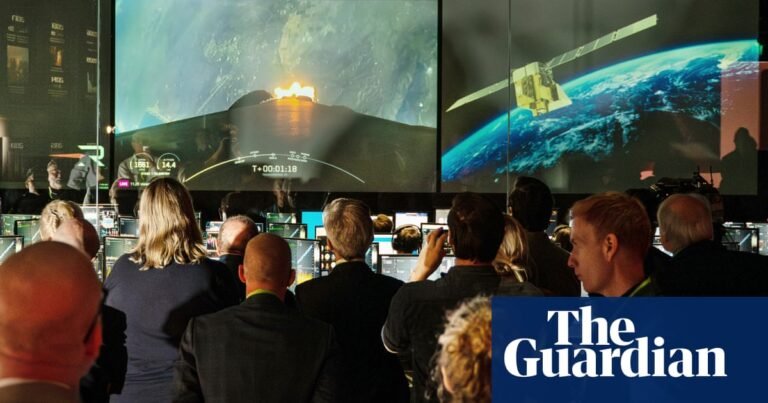For scientist Sara Mikaloff-Fletcher, the news that a methane-tracking satellite was lost in space last week left her feeling like the air had been sucked from her lungs.
It happened just days before New Zealand was due to take control of the spacecraft, known as MethaneSat, which was designed to “name and shame” the worst methane polluters in the oil and gas industry.
“It was a pretty challenging moment in my career,” says Mikaloff-Fletcher, the Wellington-based lead of New Zealand’s part of the mission. “I was anticipating until a couple of days before this news that this would be a healthy mission that would last three to five years.”
The satellite was New Zealand’s first publicly funded space mission. Yet the project had been plagued with issues and delays, and last week officials confirmed that after only 15 months in orbit the satellite had lost contact with the ground and was likely unrecoverable.
The loss of the satellite dealt a heavy blow to the country’s fledgling government-funded space sector. New Zealand initially invested NZ$29m in MethaneSat, a project led by the US non-profit Environmental Defense Fund (EDF) with other finance coming from the Bezos Earth Fund, the Audacious Project and the Valhalla Foundation.
The satellite’s primary goal was to detect methane leaks from oil and gas production worldwide. But in New Zealand, Mikaloff-Fletcher leads a complementary project to explore if the satellite could also track the release of the potent greenhouse gas from agriculture. Methane from livestock accounts for almost half of New Zealand’s greenhouse gas emissions.
The project was years in the making and some experts have criticised New Zealand’s involvement. In 2019, the government agreed to invest in the mission but the satellite’s launch was delayed until March 2024. Almost NZ$12m of the funding was used to build a mission control centre at Rocket Lab, a private space company with a launchpad on the remote east coast of New Zealand and also operating from the US.
The University of Auckland was to take over mission control last year but problems led to further delays. They included the satellite going into safe mode due to intense solar activity, and issues with operating its thrusters. The university never took control because the satellite stopped responding on 20 June. By this point New Zealand’s total investment had risen to NZ$32m, according to the New Zealand Space Agency, because of additional funding allocated to maintain capability to take over operations.
Judith Collins, minister for space in the New Zealand government, declined to comment on the loss of MethaneSat. The deputy head of the New Zealand Space Agency, Andrew Johnson, described it as “clearly a disappointing development”.
But Johnson says involvement in the mission has strengthened New Zealand’s expertise and space capability, and the mission control centre at the University of Auckland’s Te Pūnaha Ātea Space Institute will continue to be used as a training facility to position the country for future missions.
However, Richard Easther, a University of Auckland physicist who is not involved in the project, says it was a mistake for New Zealand to invest in MethaneSat. He was initially excited about the mission, but says it’s become “clear they haven’t been able to keep to schedule and deliver a functional spacecraft”.
While the mission was deploying new methane-detecting sensors, the design of the spacecraft itself was not as well defined as it should have been when New Zealand invested in it and parts of it “haven’t been tested in space”.
The MethaneSat under construction. Photograph: 2024 Ball Aerospace/BAE Systems
MethaneSat’s mission lead and chief scientist for EDF Steve Hamburg says the mission was “technologically ambitious” and the team that developed the satellite “includes some of the world’s most seasoned professionals in both public and private sector space flight”.
Johnson says the providers of the satellite’s structural and functional components, as well as the sensor, were selected before New Zealand joined the mission, but given the expertise of the professionals involved, “we had no reason to doubt their judgement.”
Jon Coifman, a spokesperson for MethaneSat, says it was unclear what caused the loss of contact, but an expert panel had been set up to investigate. The existing datasets would remain accessible “for the foreseeable future” and more data would be released over the next few months. The team remains “undeterred in our efforts to drive down methane pollution”.
“No other satellite could match the ability to detect changes in methane levels with such high resolution and high sensitivity over such wide areas,” Coifman says.
Mikaloff-Fletcher says there have been other missions that have faced similar challenges.
“A great example is Nasa’s Orbital Carbon Observatory mission, meant to deliver the most precise measurements of carbon dioxide ever made from space. It was launched in 2009 and fell into the ocean without making a single measurement,” Mikaloff-Fletcher says, though she notes further satellites were launched to achieve the mission.
She says MethaneSat did record data that will be useful in tracking agricultural emissions, and her work in the field will continue despite the setback.
Preliminary analysis shows the satellite’s observations over agricultural targets in New Zealand line up well with modelling and measurements collected by aircraft-borne instruments, suggesting “we will be able to quantify agricultural emissions in a wide range of different farming systems from existing data”.
“The satellite’s life may be shorter than hoped, but the project will go on to shed new light on agricultural emissions from the data we have.”
